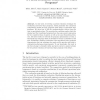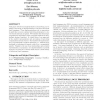125
click to vote
ENTCS
2002
15 years 1 months ago
2002
Non-deterministic computations greatly enhance the expressive power of functional logic programs, but are often computationally expensive. We analyze a programming technique that ...
105
click to vote
ENTCS
2007
15 years 1 months ago
2007
Computing with failures is a typical programming technique in functional logic programs. However, there are also situations where a program should not fail (e.g., in a determinist...
116
click to vote
ENTCS
2007
15 years 1 months ago
2007
Debugging by observing the evaluation of expressions and functions is a useful approach for finding bugs in lazy functional and functional logic programs. However, adding and rem...
118
click to vote
LPAR
1999
Springer
15 years 6 months ago
1999
Springer
In this work, we develop a partial evaluation technique for residuating functional logic programs, which generalize the concurrent computation models for logic programs with delays...
147
click to vote
ICFP
1999
ACM
15 years 6 months ago
1999
ACM
Functional logic languages combine the operational principles of the most important declarative programming paradigms, namely functional and logic programming. Inductively sequent...
135
click to vote
CL
2000
Springer
15 years 6 months ago
2000
Springer
How to extract negative information from programs is an important issue in logic programming. Here we address the problem for functional logic programs, from a proof-theoretic pers...
111
click to vote
PPDP
2001
Springer
15 years 6 months ago
2001
Springer
This paper describes an implementation of narrowing, an essential component of implementations of modern functional logic languages. These implementations rely on narrowing, in pa...
110
click to vote
ICLP
2005
Springer
15 years 7 months ago
2005
Springer
Abstract. Information about the nondeterminism behavior of a functional logic program is important for various reasons. For instance, a nondeterministic choice in I/O operations re...
203
click to vote
POPL
2002
ACM
16 years 2 months ago
2002
ACM
Functional logic overloading is a novel approach to userdefined overloading that extends Haskell's concept of type classes in significant ways. Whereas type classes are conce...


